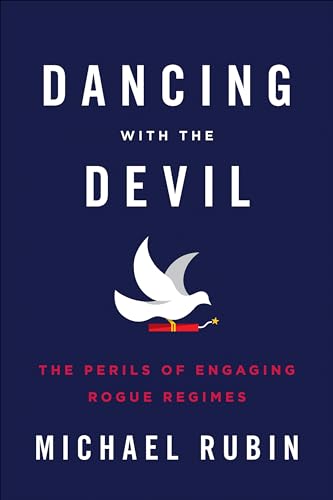Articoli correlati a Dancing with the Devil: The Perils of Engaging Rogue...

Sinossi
Engagement with rogue regimes is not cost-free, as Michael Rubin demonstrates by tracing the history of American diplomacy with North Korea, Iran, Iraq, Libya, the Taliban&;s Afghanistan, and Pakistan. Further challenges to traditional diplomacy have come from terrorist groups, such as the PLO in the 1970s and 1980s, or Hamas and Hezbollah in the last two decades. The argument in favor of negotiation with terrorists is suffused with moral equivalence, the idea that one man&;s terrorist is another man&;s freedom fighter. Rarely does the actual record of talking to terrorists come under serious examination.
While soldiers spend weeks developing lessons learned after every exercise, diplomats generally do not reflect on why their strategy toward rogues has failed, or consider whether their basic assumptions have been faulty. Rubin&;s analysis finds that rogue regimes all have one thing in common: they pretend to be aggrieved in order to put Western diplomats on the defensive. Whether in Pyongyang, Tehran, or Islamabad, rogue leaders understand that the West rewards bluster with incentives and that the U.S. State Department too often values process more than results.
Le informazioni nella sezione "Riassunto" possono far riferimento a edizioni diverse di questo titolo.
Informazioni sull?autore
Le informazioni nella sezione "Su questo libro" possono far riferimento a edizioni diverse di questo titolo.
GRATIS per la spedizione in U.S.A.
Destinazione, tempi e costiCompra nuovo
Visualizza questo articoloGRATIS per la spedizione in U.S.A.
Destinazione, tempi e costiRisultati della ricerca per Dancing with the Devil: The Perils of Engaging Rogue...
Dancing with the Devil: The Perils of Engaging Rogue Regimes
Da: Orion Tech, Kingwood, TX, U.S.A.
hardcover. Condizione: Good. Codice articolo 159403723X-3-33668664
Quantità: 1 disponibili
Dancing with the Devil: The Perils of Engaging Rogue Regimes
Da: The Maryland Book Bank, Baltimore, MD, U.S.A.
hardcover. Condizione: Very Good. Used - Very Good. Codice articolo 4-M-3-0607
Quantità: 1 disponibili
Dancing with the Devil: The Perils of Engaging Rogue Regimes
Da: Wonder Book, Frederick, MD, U.S.A.
Condizione: Very Good. Very Good condition. Good dust jacket. A copy that may have a few cosmetic defects. May also contain light spine creasing or a few markings such as an owner's name, short gifter's inscription or light stamp. Bundled media such as CDs, DVDs, floppy disks or access codes may not be included. Codice articolo Z07G-00906
Quantità: 1 disponibili
Dancing with the Devil: The Perils of Engaging Rogue Regimes
Da: ThriftBooks-Atlanta, AUSTELL, GA, U.S.A.
Hardcover. Condizione: Good. No Jacket. Pages can have notes/highlighting. Spine may show signs of wear. ~ ThriftBooks: Read More, Spend Less 1.8. Codice articolo G159403723XI3N00
Quantità: 1 disponibili
Dancing with the Devil: The Perils of Engaging Rogue Regimes
Da: ThriftBooks-Atlanta, AUSTELL, GA, U.S.A.
Hardcover. Condizione: Very Good. No Jacket. Former library book; May have limited writing in cover pages. Pages are unmarked. ~ ThriftBooks: Read More, Spend Less 1.8. Codice articolo G159403723XI4N10
Quantità: 1 disponibili
Dancing with the Devil : The Perils of Engaging Rogue Regimes
Da: Better World Books, Mishawaka, IN, U.S.A.
Condizione: Very Good. First American Edition. Former library book; may include library markings. Used book that is in excellent condition. May show signs of wear or have minor defects. Codice articolo 8010545-6
Quantità: 1 disponibili
Dancing with the Devil: The Perils of Engaging Rogue Regimes
Da: ThriftBooks-Dallas, Dallas, TX, U.S.A.
Hardcover. Condizione: Good. No Jacket. Pages can have notes/highlighting. Spine may show signs of wear. ~ ThriftBooks: Read More, Spend Less 1.8. Codice articolo G159403723XI3N00
Quantità: 1 disponibili
Dancing with the Devil: The Perils of Engaging Rogue Regimes
Da: HPB-Diamond, Dallas, TX, U.S.A.
hardcover. Condizione: Very Good. Connecting readers with great books since 1972! Used books may not include companion materials, and may have some shelf wear or limited writing. We ship orders daily and Customer Service is our top priority! Codice articolo S_428477931
Quantità: 1 disponibili
Dancing with the Devil: The Perils of Engaging Rogue Regimes
Da: Book Outpost, Blawnox, PA, U.S.A.
Condizione: Very Good. Moderate wear to corners/edges from shelving. Codice articolo S-6-0026572
Quantità: 1 disponibili
Dancing with the Devil: The Perils of Engaging Rogue Regimes
Da: Book Outpost, Blawnox, PA, U.S.A.
Condizione: Good. Cover has a crease/tear, book is in good condition. Codice articolo S-6-0026575
Quantità: 1 disponibili

